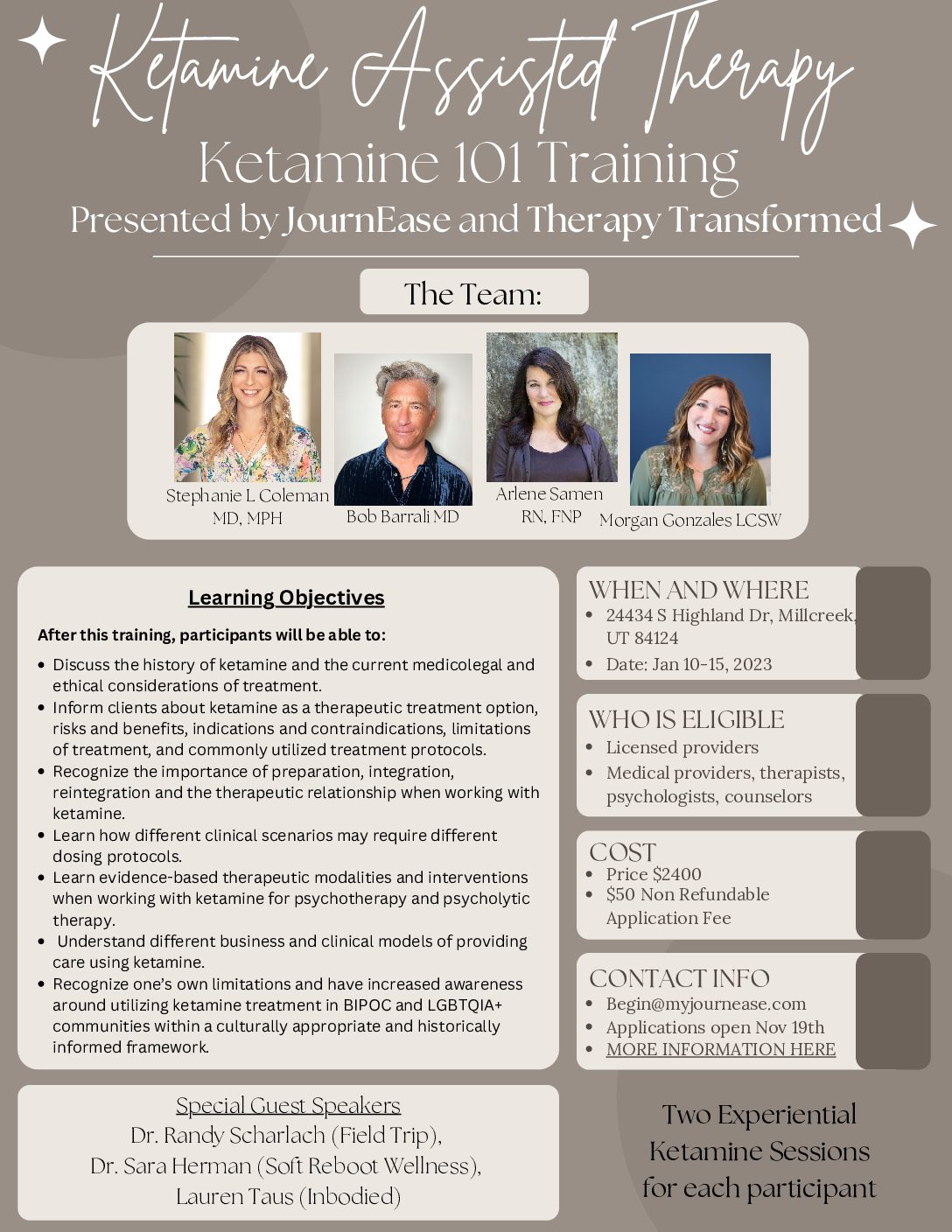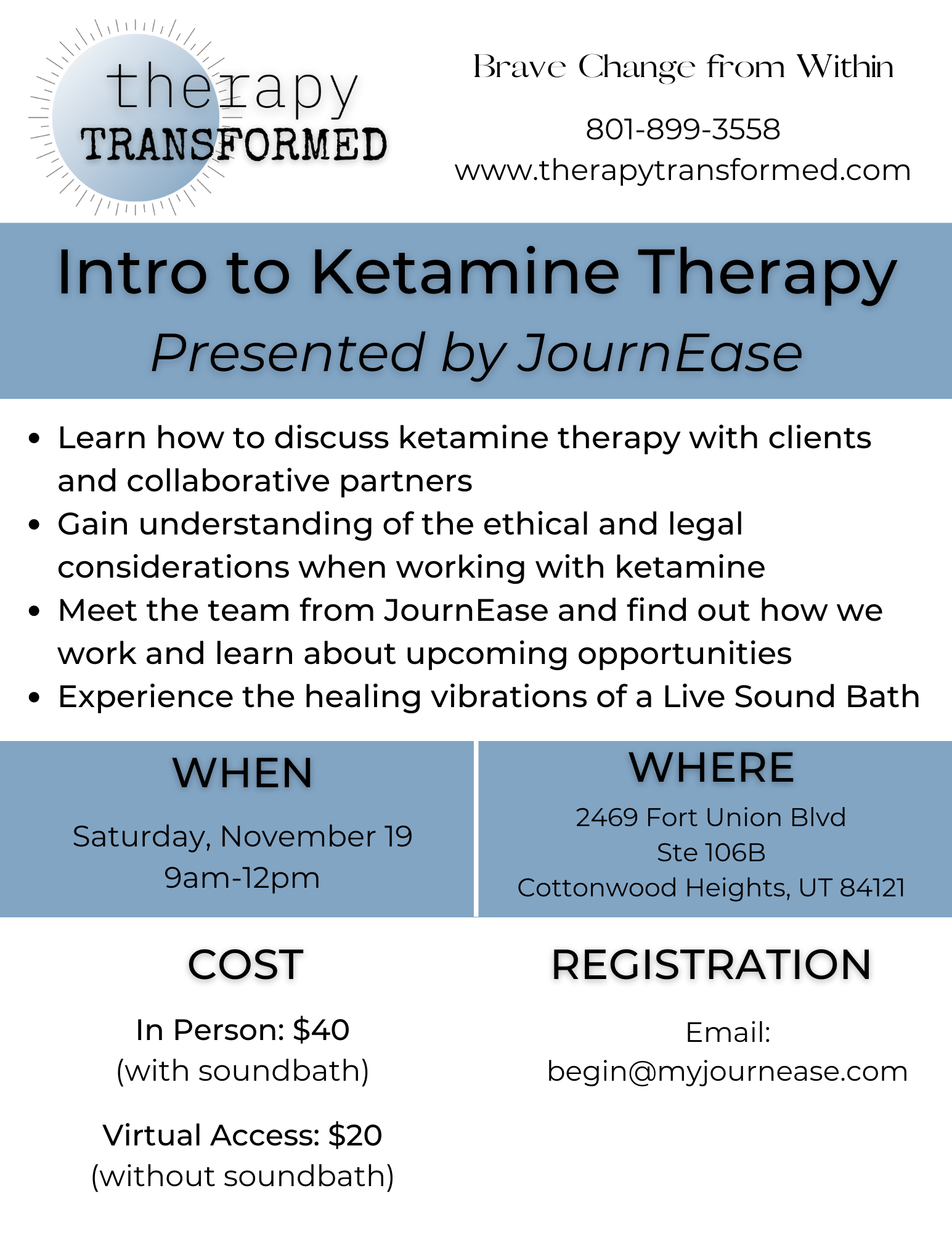
Therapy Transformed in the News
Take a look at City Weekly’s article about ketamine treatments in Utah featuring our very own Morgan Gonzales, LCSW.

Take a look at City Weekly’s article about ketamine treatments in Utah featuring our very own Morgan Gonzales, LCSW.
Therapy Transformed is so excited to be presenting with JournEase again for Ketamine 101. This in depth training is an excellent opportunity to expand your knowledge and experience in the field of ketamine assisted therapy. We can’t wait for you to join us!
Who We Are
JournEase and Therapy Transformed are among the leaders of ethical and effective ketamine providers in Utah. Our collaborative model of doctors and therapists provide a fully supported ketamine journey with wrap around care.
Experiential Training
Ketamine 101 is a fully experiential training with a team of licensed professionals who have many years of experience providing ethical and effective ketamine assisted therapy to patients across the country. This course will give licensed professionals the opportunity to learn the history of ketamine, ethical uses for today, practical applications and limitations, and more. There will also be 2 experiential ketamine sessions for each participant provided by our team. CEs will be available.
Continuing Education
CEs will be presented by Therapy Transformed in the following topics:
For more information on CE course offerings please check here.
Cost
$2600 per participant
$50 non-refundable application fee
See cancellation policy below
When & Where
January 10-15, 2023
24434 S Highland Dr., Millcreek, UT 84124
For Licensed Providers, Medical Providers, Therapists, Psychologists, Counselors
Applications open November 15, 2023. Last day to register is January 3, 2023
Email begin@myjournease.com to apply and inquire about accessibility accommodations
Cancellation Policy: Full tuition payment is due within 2 weeks of acceptance notice. Application fees are non-refundable. We are unable to transfer tuition payments to a subsequent training in the event of any cancellations. Please understand that cancellations impose a burden on our staff and the below policy covers us in the event we are unable to fill a canceled spot. If you cancel more than 30 days prior to the training start date, you will receive a full refund of tuition fees, minus deposit. If you cancel less than 30 days from the training start date, you will be refunded 50% of tuition fees. Cancellations 2 weeks or less from the training start date forfeit all of the tuition fees.

Therapy Transformed is so excited to begin Mindful Movement sessions! These sessions will be available near our Utah office locations and will provide an opportunity to move your body in nature as a supportive aspect to regular therapy.
Moving our bodies in nature is an integral piece of starting to heal ourselves. The mindful movement session helps to create space for our mind, body, and soul to create deeper self connection and meaning making. Our therapists are trained in somatic resourcing, grounding and utilization of nature for integration. The intention and benefit of these sessions is to incorporate nature and movement as a catalyst to deeper healing and to complement your current therapy practice.
 How is Mindful Movement helpful?
How is Mindful Movement helpful?Mindful movement sessions provide the opportunity to focus on somatic work and to become your own internal healer. We go throughout our daily lives with consistent activation and triggers that feel overwhelming or uncomfortable to our psyche. The goal with mindful movement is to have more connection with our bodies to identify and to recognize our activation and learn skills that will help deactivate and re-regulate our nervous system. Thus, these sessions are provided as an adjunct to traditional talk therapy, accenting cognitive and intellectualized strategies and provide a holistic method of healing and skill building. Nature provides an enhanced medium in which to ground ourselves and practice self regulation.
 What do these sessions look like?
What do these sessions look like?Mindful movement session structure: Meet your therapist at a designated location. Your therapist will begin by helping you start with intention setting, somatic mindfulness and then attune to your needs as you move your body. These mindful movements t can be walking, sitting, stretching or a mix of these: it’s about slowing down, and learning to listen to yourself.

Therapy Transformed is excited about this amazing training opportunity with JournEase. This training is specifically for professionally licensed health care workers who are ready to work with ketamine in their practice. This experiential training will be offered January 10-15, 2023 in Salt Lake City, Utah with other locations and dates to follow. Click here for more information!

Who is a good fit for ketamine?
What are the ethics regarding ketamine?
Where do I start with offering ketamine therapy?
Why use ketamine instead of antidepressants?
How do I talk to clients about ketamine?
If you’ve ever had these questions or more regarding ketamine therapy then come join us November 19 for an Intro to Ketamine Therapy special event. Therapy Transformed is very excited to join JournEase in offering this event specifically to answer all your questions about Ketamine Therapy. Meet the JournEase team – a group of skilled clinicians working to train and spread awareness around effective and ethical ketamine practices.
Registration is only $40 and includes a soundbath demonstration. Register HERE.
Not in Utah? Join us virtually! JournEase will send you a link to join virtually so you can get all the ketamine details. Please note this option does not include the soundbath demonstration. Register for virtual access HERE.
Have questions? Contact JournEase through email: begin@myjournease.com
You can also check out our Ketamine FAQ post for more information regarding ketamine assisted psychotherapy here in Utah.